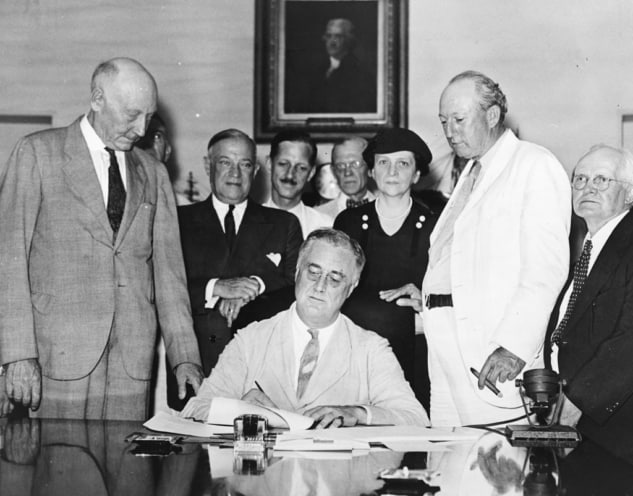Happy 86th Anniversary to Social Security
Originally published in Common Dreams
One of our nation’s most popular federal programs marks another year of success on August 14th. Social Security—the income security program for workers, retirees, people with disabilities, and their families – was signed into law by President Franklin D. Roosevelt 86 years ago. But it’s been almost four decades since the program was last reformed. In 1983, Congress took action to shore up Social Security’s finances under the acute threat of insolvency. Fast-forward to the present. We are confronted with a looming shortfall in the program’s finances amid a growing demand to boost benefits. But bi-partisan action to strengthen Social Security has been elusive—despite the best efforts of some lawmakers to put forward solid proposals.
Here is what we are facing: The 2020 Social Security Trustees report projected that the program’s trust fund will run dry in 2034. (The 2021 report is overdue.) At that point, Social Security could still pay 76% of benefits. But seniors cannot afford a 24% cut. In fact, they cannot withstand any cuts—especially when their benefits are already so modest.
Most beneficiaries rely on Social Security for the majority of their income, meaning millions of seniors live ‘hand to mouth.’ Try living on today’s average benefit of $1,543 per month. That’s $18,500 in annual income, which is only about six thousand dollars above the federal poverty level for individuals. For women and people of color, the numbers are even lower: $16,500 and $14,800, respectively.
Retirees shouldn’t have to skim so close to the poverty line after contributing to Social Security for most of their lives. Let’s remember that the reason President Franklin Roosevelt created Social Security in 1935 was to keep seniors out of the ‘poor house.’ (It wasn’t just a figure of speech. Millions of older Americans were, in fact, dwelling in poor houses across the country before Social Security was enacted.)
Eighty-six years later, the benefits are no longer adequate. Social Security cost-of-living adjustments (COLAs) are failing to keep pace with seniors’ living expenses from year to year. While next year’s COLA is projected to be higher than in the recent past (because of pandemic-related inflation), previous COLAs have been relatively paltry—even dropping to zero three times since 2010. This is largely because COLAs are calculated based on the Consumer Price Index for Wage Earners and Clerical Workers (CPI-W), which doesn’t reflect seniors’ spending priorities.
If anything, seniors will need more accurate COLAs and higher benefits to survive financially in the mid-21st century. Middle-class income—which has been all but stagnant for decades—is expected to remain flat through 2030, according to a Kaiser Family Foundation estimate. At the same time, seniors’ expenses will continue to rise, especially in the areas of health care and housing. Kaiser projects that Medicare beneficiaries’ out of pocket medical costs could consume half of their average Social Security income by 2030. A Harvard study found that the number of senior households burdened by housing costs will increase 37% by 2035 (the same year that older Americans will face that 24% benefit cut if Congress doesn’t act to strengthen Social Security).
With retirement savings declining and employer-provided pensions disappearing, tomorrow’s seniors will rely even more on Social Security to make ends meet. That’s why the program must be expanded and strengthened. Despite the ongoing media narrative that “no one in Congress wants to touch” Social Security, there are earnest efforts on Capitol Hill to fortify the program’s finances and increase benefits.
Rep. John Larson (D-CT), Chairman of the House Ways and Means Social Security subcommittee, will soon introduce a bill based on his earlier legislation, the Social Security 2100 Act. It’s expected to to align with President Biden’s proposals for strengthening and expanding Social Security.
The Social Security 2100 Act included an across-the-board increase for all beneficiaries, along with targeted increases for the most vulnerable—including widows, widowers, and low-income retirees. It also called for the adoption of a more accurate formula for calculating COLAs, known as the CPI-E (Consumer Price Index for the Elderly). The CPI-E is much fairer and more accurate for seniors than the CPI-W because it better reflects what seniors spend most of their income on—especially health care.
Along with these proposals, we hope President Biden’s support for family caregiver credits will be included in the new bill. Caregiver credits bolster workers’ retirement benefits so they are not penalized for taking a break from paid work to care for loved ones.
How would all of this be paid for? By asking the wealthy to contribute their fair share in Social Security payroll taxes. Right now, payroll wage contributions are capped at $142,800. Growing income inequality over the past four decades has decreased the percentage of overall wages subject to Social Security payroll taxes. The cap should be adjusted so that high-earners make payroll contributions on wages exceeding $400K per year, honoring President Biden’s pledge not to raise taxes on anyone earning less. This new revenue would extend the solvency of the Social Security trust fund beyond its projected depletion date.
Unfortunately, there are some in Congress who want to cut Social Security benefits in the name of fiscal austerity. Many conservatives claim that the program must be slashed in order to reduce the national deficit, even though the program is self-funded and doesn’t contribute to federal red ink. These calls increased after the deficit-swelling Trump tax cuts for the wealthy and big corporations blew a $1.5 trillion hole in the federal budget.
Now, some ‘fiscal hawks’ are proposing the creation of special Congressional commissions to decide the fate of Social Security, whose recommendations would bypass the traditional legislative process and be fast-tracked to a floor vote. The program could be cut without seniors and their advocates having so much as a seat at the table.
Conservatives are also pushing to raise the Social Security retirement age. (Congress already enacted a phased-in increase from age 65 to 67 as part of the 1983 reforms.) Now, proposals are being floated to increase the age again to 69 or 70. This would be a massive benefit cut, and assumes that all workers—regardless of health status or profession—can work that long. The truth is, millions can’t, and will be severely impacted if their benefits are slashed.
Opponents of benefit expansion insist that younger adults shouldn’t ‘support’ today’s seniors, even though Social Security has worked extremely well as an intergenerational compact since 1935. In fact, the younger generations will also retire someday. And if current socioeconomic trends continue, they will need every penny of their Social Security benefits—and more. Many will also need Social Security’s disability and survivor’s benefits long before they retire.
As Rep. Larson points out, while Congress made changes to the program in 1983, benefits haven’t actually been expanded since 1972! Everything has changed since then—the need for two-income households, the disappearance of pensions, growing wage inequality, the diminishment of unions, worsening retirement disparities for women and communities of color, and more. This is a historic opportunity for Congress to take action for the people—and build upon the foundation of Social Security that President Roosevelt began eight-six years ago.
Biden Pushes Prescription Drug Reform, Medicare Expansion
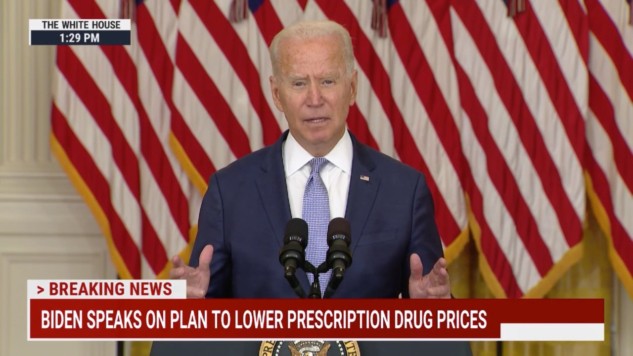


MSNBC
President Biden made a forceful appeal to Congress Thursday on two of the most crucial issues facing American seniors: prescription drug pricing and Medicare expansion. He urged lawmakers to allow Medicare to negotiate prices with Big Pharma – something we and other seniors’ groups have long advocated – as part of a package of prescription drug pricing reforms. The President then called on Congress to use those cost savings (estimated at more than $300 billion over ten years) to widen Medicare benefits to include dental, vision, and hearing coverage.
“For years, the price of many prescription drugs has dramatically outpaced inflation. These prices have put the squeeze on too many families… They’ve been forced into terrible choices, between maintaining their health, paying the rent or the mortgage, putting food on the table. And that’s the case for a lot of working families and seniors.” – President Biden, 8/12/21
This is the first time a President has used the ‘bully pulpit’ in such a specific way to deliver seniors relief from prescription price gouging – and to expand Medicare to include these additional coverages. Interestingly enough, the term ‘bully pulpit’ originated with President Theodore Roosevelt. In reading-over his upcoming Presidential message to Congress, Roosevelt said, “I suppose my critics will call (it) preaching, but I’ve got such a bully pulpit!” Today, President Biden knows he cannot force Congress to adopt his proposals, but he can put the moral authority of the White House behind the effort.
“Right now, when Americans overpay for prescription drugs, too many pharmaceutical companies don’t use the profit nearly enough to innovate or research. Too many companies use it on buying back their stock, inflate their worth, drive up CEO’s salaries and compensation, and find ways to box out the competition.” – President Biden, 8/12/21
President Biden’s proposals could provide real relief to seniors’ pocketbooks.
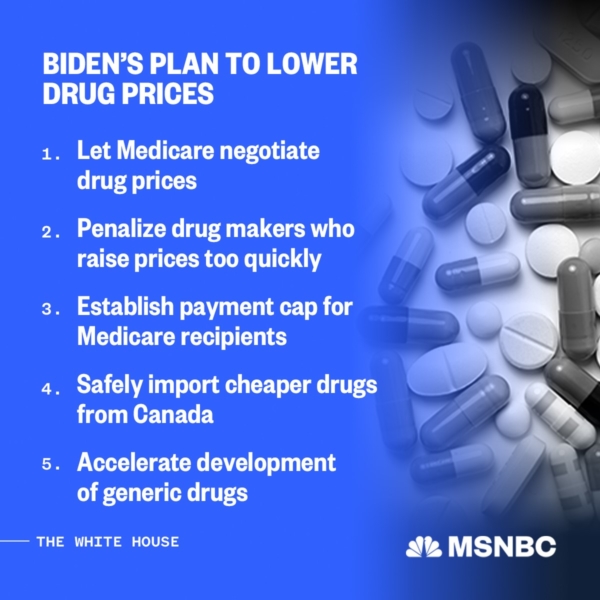


Kaiser Health News reports that drug pricing legislation introduced in the 116th Congress would have reduced spending by $117 billion for Medicare Part D beneficiaries from 2020 to 2029. That includes a reduction of $102.6 billion in cost sharing for patients who use Part D-covered drugs. This represents significant potential savings for older Americans, many of whom are living on fixed incomes and simply can’t afford current drug prices. What have they done instead? Many seniors are rationing medications or not filling prescriptions altogether — or, as President Biden pointed out, having to make painful choices between paying for things like food, housing, or medicine.
Something similar is happening with enrollees in Medicare Part B, which does not currently cover basic dental, vision, or hearing care. Kaiser Family Foundation reports:
“Almost half of all Medicare beneficiaries did not have a dental visit within the past year (47%), with higher rates among those who are Black (68%) or Hispanic (61%), have low incomes (73%), or who are in fair or poor health (63%)…” – Kaiser Family Foundation
There is equally disturbing data about seniors forgoing proper hearing and vision care, too, because of a lack of Medicare coverage — even though that type of care is the gateway to good health. Neglecting dental, vision, and hearing care can lead to serious and life-threatening conditions, which is why it’s appropriate for President Biden to wield the moral authority of the his office on this issue.
Lawmakers have introduced numerous bills – in the current Congress and in previous sessions – to rein-in prescription drug prices and expand Medicare benefits. But GOP leader Mitch McConnell obstructed those bills in the Senate. Now that the Democrats have control of the White House, Senate, and House – albeit by thin margins – these bills are being incorporated into a single package. Democratic leadership plans to enact key facets of these proposals – including the President’s own – on a party-line vote through the budget reconciliation process. The Senate this week passed a budget blueprint, including President Biden’s entire $3.5 trillion dollar spending package, laying the foundation for Medicare price negotiation and dental, vision, and hearing benefits.
The ball is now in the House’s court to approve the budget blueprint, and initiate a reconciliation process to be hashed out in the fall. House Democrats already are divided on some parts of this agenda, including the price tag. President Biden can help assure that the most crucial provisions for seniors remain intact by continuing to apply pressure on Congress, and to keep using that bully pulpit until the job is done.
Rep. Larson to Introduce Revised Social Security Expansion Bill



Next week, Social Security will mark its 86th anniversary of providing Americans with basic financial security in old age (and, since 1956, upon becoming disabled). And yet, quite incredibly, baseline Social Security benefits haven’t been expanded in fifty years – even though seniors’ living costs have soared over the decades. Congressman John Larson (D-CT) is once again hoping to change that. Larson, a true Social Security champion who introduced legislation to boost Social Security in previous Congresses, has now released the details of a revamped bill to increase benefits and extend the program’s solvency.
The updated legislation is called Social Security 2100: A Sacred Trust. The name echoes candidate Joe Biden’s declaration during the 2020 campaign that Social Security is a “sacred obligation.” In fact, Larson revised his bill to align with President Biden’s proposals for Social Security, which also aim to strengthen and expand the program. Here are some of the many ways the bill would enhance seniors’ retirement security:
*Increases benefits across the board for all Social Security beneficiaries
*Improves the Cost-of-Living-Adjustment (COLA), so it reflects the inflation actually experienced by seniors.
*Ensures no one retires into poverty after a full career of work by improving benefits for long-serving, low-wage workers
*Improves benefits for widows and widowers from two-income households.
*Restores student benefits up to age 22, for the dependent children of disabled, deceased, or retired workers.
The bill also would boost customer service from the Social Security Administration (SSA) by preventing unnecessary field office closures and requiring the agency to mail annual statements to all workers 25 and older.



Rep. John Larson (D-CT) has been a true champion of Social Security
These are long-awaited improvements that Social Security beneficiaries need after years of flat incomes and rising living expenses. Congressman Larson would pay for these enhancements by adjusting the payroll wage cap so that high earners pay their fair share. Social Security contributions are currently capped at $142,800 in annual wages. The new bill would reimpose the payroll tax after $400,000 in wages, bringing the program much-needed revenue – and honoring President Biden’s pledge not to raise taxes on anyone earning under $400,000 a year.
The National Committee strongly supports Rep. Larson’s ongoing efforts to boost Social Security. Congressman Larson is currently seeking cosponsors in the House for the bill. (His previous legislation had more than a hundred.) He is expected to officially introduce the bill in September, after the House returns from summer recess.
If the legislation passes the House, it would need at least 60 votes in the Senate. That would require ten Republican votes. Though many Republicans have called for Social Security benefit cuts, they may be compelled to vote for Larson’s bill. Policy insiders point out that Republicans haven’t yet been forced to cast a floor vote on this issue, noting that expanding Social Security and asking the wealthy to pay more are “wildly popular” with voters.
.
It Took Political Will to Enact Medicare 56 Years Ago Today
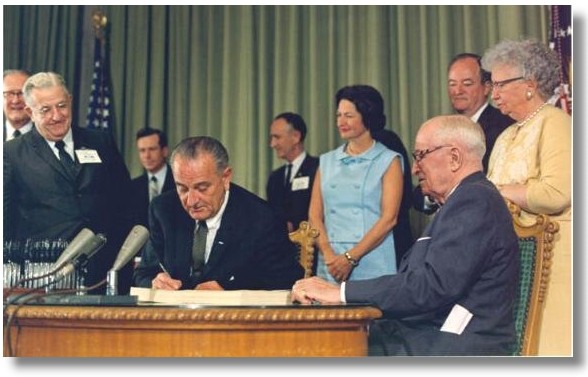


On this day in 1965, President Lyndon B. Johnson signed Medicare (and Medicaid) into law, providing hundreds of millions of Americans with health coverage over the ensuing decades. But it wasn’t an easy road to passage. It took a fervent belief in people’s right to affordable health care – even if they are older or poorer – along with a healthy dose of political will. Today, President Biden and Democrats in Congress are committed to expanding LBJ’s signature programs in what some have described as a new “Great Society.” Today’s seniors badly need vision, dental, and hearing coverage that traditional Medicare has never provided – and Democrats are poised to finally get it done. But it will take the same political will that the party mustered fifty-six years ago in enacting Medicare.
Many in Congress opposed Medicare from the start, labeling it “socialism” and “socialized medicine.” (Does that sound familiar?) In 1962, Ronald Reagan warned that if Medicare were to be enacted, “One of these days you and I are going to spend our sunset years telling our children, and our children’s children, what it once was like in America when men were free.”
In order to pass, Medicare first had to overcome some opposition from within the Democratic party. The powerful House and Ways Committee chairman, Wilbur Mills (D-AR), blocked consideration of Medicare legislation, despite widespread support for the program from many fellow Democrats. Only when Lyndon Johnson won a landslide victory in the 1964 presidential election, bringing an even bigger Democratic majority to the new Congress, did Mills relent and allow Medicare to move forward.
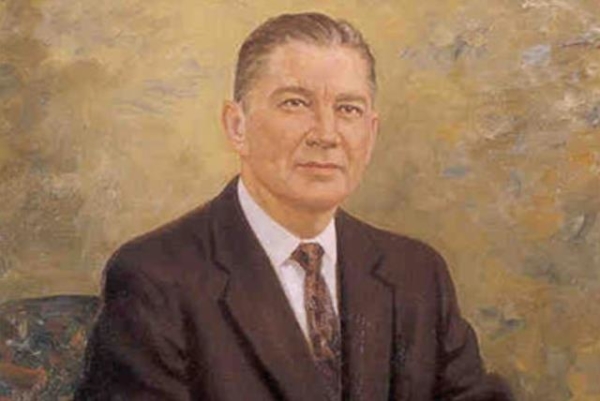


Powerful House Ways & Means Chairman Wilbur Mills was against Medicare before he was for it
Signing Medicare into law on July 30, 1965, President Johnson remarked:
“Through this new law, every citizen will be able, in his productive years when he is earning, to insure himself against the ravages of illness in his old age… We marvel not simply at the passage of this bill, but what we marvel at is that it took so many years to pass it.“ – President Lyndon B. Johnson
Today, President Biden and the Democrats do not have the enviable Congressional majorities the party enjoyed in 1965, making it more difficult to “go big” on expanding social programs through the normal legislative process. Most Republicans are no more likely to support Medicare expansion now than they were the program itself 56 years ago. For that reason, Democrats are planning to add dental, vision, and hearing coverage to Medicare as part of President Biden’s proposed $3.5 trillion spending plan through the budget reconciliation process, which could pass on a party-line vote in the Senate.
Opponents, predictably, have slammed the President’s spending plan using all-too-familiar rhetoric. Sen. John Barrasso (R-WY) called it “a freight train to Socialism.” And there are the usual GOP cries that expanding the programs that help everyday Americans will swell the debt, never mind that that the Trump/GOP tax cuts for the wealthy and big corporations added a $1.5 trillion torrent of red ink.
To enact Medicare expansion through the budget reconciliation process, Democrats will need all 50 Democratic senators to vote for the spending package. Sen. Joe Manchin (D-WV) has voiced tentative support for the $3.5 trillion proposal, while fellow moderate Sen. Kyrsten Sinema (D-AZ) announced this week she opposed the price tag as too large. If Democrats eventually coalesce around a lower, compromise spending amount, the provisions for expanding Medicare benefits may shrink accordingly. Any new dental, vision, and hearing benefits were likely to be modest in the first place, so seniors should rightly demand their Senators to unite around the most robust improvements possible.
The National Committee to Preserve Social Security and Medicare has long advocated to expand Medicare to meet the needs of today’s seniors:
“I know some members of Congress may consider hearing dental and vision benefits to be luxuries. But if you need to see a dentist, if you can’t see properly, if you can’t hear alarms, it’s not a luxury. It’s essential for the safety and health of older people.” – Max Richtman, president and CEO, National Committee to Preserve Social Security and Medicare, 7/27/21
This moment in history provides perhaps the best opportunity to expand Medicare in the past two decades. Democrats do not hold as much power on Capitol Hill as they did 56 years ago, but they must push to the finish line on Medicare expansion and overcome obstructionism. In short, they must channel the political will the party demonstrated in 1965 to achieve a long-held goal that improves the lives of generations of American seniors.
Social Security Shouldn’t Be Dragged Into Debt Limit Debate



Wikimedia Commons
Republicans are once again threatening to drag Social Security into the process of raising the federal debt limit. Congress must raise the limit soon in order for the U.S. to meet its financial obligations. But Senator Lindsey Graham (R-SC) told Bloomberg today that he wouldn’t support raising the debt limit unless special commissions were established to “reform” Social Security and Medicare (translation: “cut benefits”). Senator Graham tried a similar ploy ten years ago when the debt ceiling needed to be raised:
“This is an opportunity to make sure the government is changing its spending ways. I will not vote for the debt ceiling increase until I see a plan in place that will deal with our long-term debt obligations starting with Social Security.” – Sen. Lindsey Graham, 2011
This was a red herring then, and it still is today. Social Security is self-funded and does not impact the federal debt. But ‘fiscal hawks’ like to conflate it with the debt issue in order to try to cut a program they have opposed since the beginning, despite its broad popularity among the American public. In fact, the main drivers of the debt are ‘tax expenditures’ (revenue the federal government forgoes through tax breaks and tax cuts benefitting mostly the wealthy and big corporations). Republicans passed the Trump/GOP tax cuts of 2017 with little regard for its impact on the debt, under the false promise that it would create jobs.
Senate Majority Leader Chuck Schumer calls GOP obstruction on the debt limit “shameless, cynical and totally political.”
“Schumer said Republicans did not raise such concerns during the presidency of Republican Donald Trump and that some of the debt is related to emergency aid in response to the COVID-19 pandemic.” – Reuters, 7/21/21
Nevertheless, Senate GOP leader Mitch McConnell predicts that “not a single Republican” will vote to raise the debt limit this year, citing Democrats’ plans to spend trillions on infrastructure, even though the money owed by the federal government is for past – not future – spending.
“Leader McConnell should not be playing political games with the full faith and credit of the United States,” said Schumer. “Americans pay their debts.”
In the past, Republicans have shut down the federal government over fiscal impasses like this one. Democratic leaders are pondering their options for raising the debt limit without Republican votes, taking seriously Treasury Secretary Janet Yellen’s warning that the United States could risk defaulting on its financial obligations as soon as August in the absence of Congressional action.
Social Security beneficiaries could also pay a price for Republican obstruction on Capitol Hill. If Congress fails to act in time to either raise or suspend the debt limit, benefit checks could be delayed for weeks, possibly longer. Seniors and people with disabilities dependent on their Social Security benefits to pay essential monthly expenses simply cannot afford that kind of disruption – nor should they have to.
As we wrote in 2011 when the GOP tried this same ploy, “Americans of all ages and political parties reject Social Security cuts. We need to remind our representatives in Congress and the Senate that Social Security is a promise to the American people that should not be broken.”



